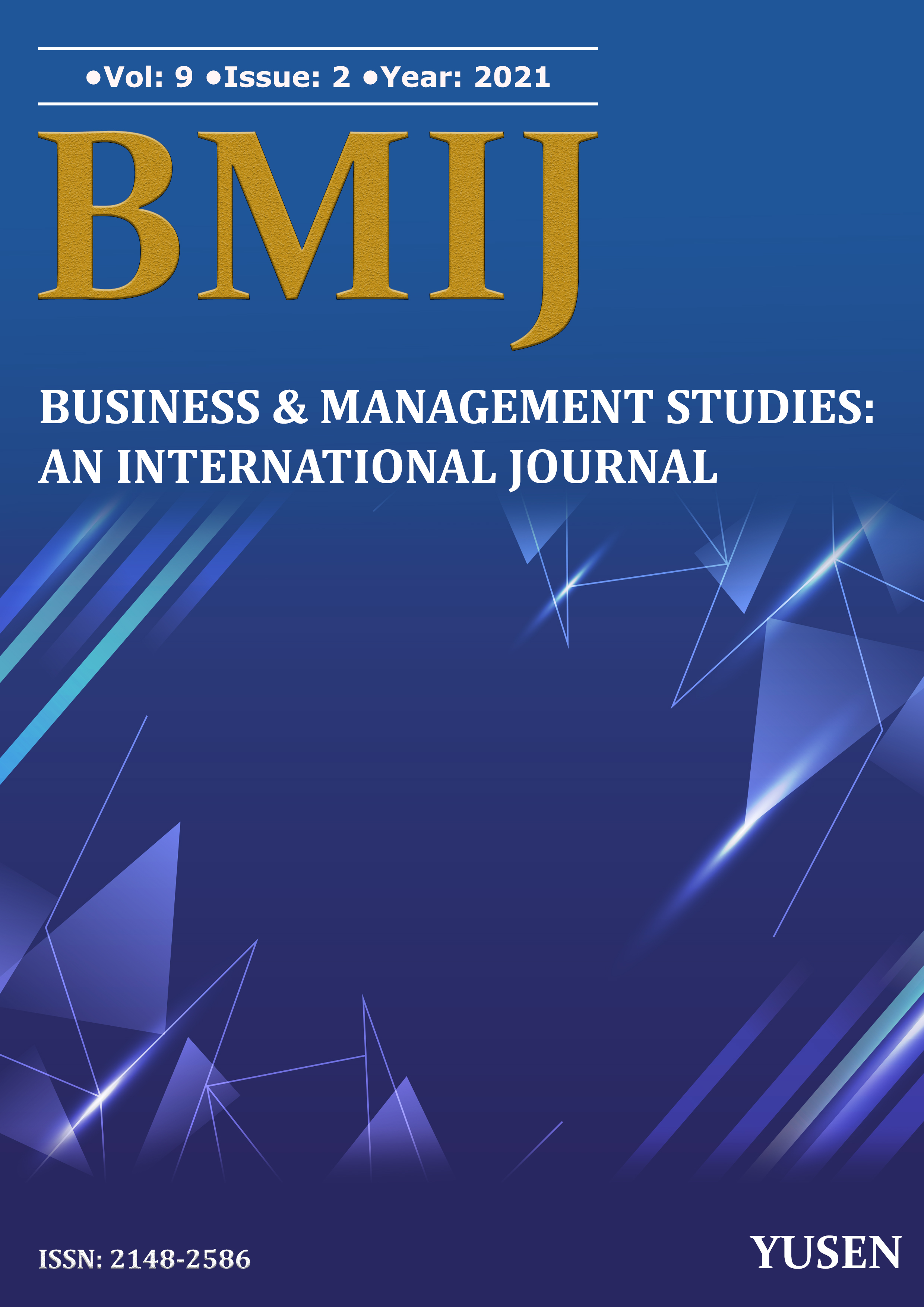The effect of entrepreneurship, innovation, and economic growth on the global competition: Panel data analysis

Published 2021-06-25
Keywords
- Girişimcilik,
- İnovasyon,
- Ekonomik Büyüme,
- Küresel Rekabet,
- Panel Veri Analizi
- Entrepreneurship,
- Innovation,
- Economic Growth,
- Global Competition,
- Panel Data Analysis
How to Cite
Copyright (c) 2021 Ceyda Kurtulmuş- Arzu Karaman Akgül

This work is licensed under a Creative Commons Attribution-NonCommercial-NoDerivatives 4.0 International License.
Abstract
When the studies in the literature are reviewed, we often come across studies on the effects of innovation on economic growth and its effects on competition. In the studies on entrepreneurship, the number of new firms, new process indicators, employment data, etc., are the variables used to represent entrepreneurship. This study aims to examine the effect of innovation and entrepreneurship, which are the cornerstones of competition, on the global competition by considering economic growth. The number of patents and the variables of expenditure on R&D studies was used as innovation indicators in the studies. In this context, panel data analysis was used in the study, allowing both the time dimension and the unit dimension to be considered together. As a result of the study, it has been seen that the effect of R&D expenditures may be reflected with a delay and therefore hurts global competition. It has been observed that economic growth, new business intensity, and several patents positively affect global competition.
Downloads
References
- Aktan, C. C. ve Vural, İ. Y. (2004). Rekabet gücü ve rekabet stratejileri. Türkiye İşveren Sendikaları Konfederasyonu.
- Altıntaş, F. F. (2021). İnovasyon ve Girişimcilik Arasındaki İlişkinin Çok Yönlü Olarak İncelenmesine Yönelik Amprik Bir Araştırma. Igdir University Journal of Social Sciences, (26).
- Aynaoğlu, Y. (2018). Küresel rekabet endeksi ile inovasyon ve makroekonomik göstergeler arasındaki ilişkinin analizi (Master's thesis, Pamukkale Üniversitesi Sosyal Bilimleri Enstitüsü).
- Ayodele, K. O. (2013). Demographics, entrepreneurial self-efficacy and locus of control as determinants of adolescents’ entrepreneurial intention in Ogun state, Nigeria. European Journal of Business and Social Sciences, 1(12), 59-67.
- Baltagi, B. (2008). Econometric analysis of panel data. John Wiley & Sons.
- Bedir, A. (2012). Uluslararasi rekabet gücü kavramsal çerçevesinde türkiye imalat sanayii sektörlerinin rekabet etme biçimleri ve uygun politika önerisi. Gazi Üniversitesi İktisadi ve İdari Bilimler Fakültesi Dergisi, 14(1), 171-212.
- Ciocanel, A. B. ve Pavelescu, F. M. (2015). Innovation and competitiveness in European context. Procedia Economics and Finance, 32, 728-737.
- Doğan, E. (2016). The effect of innovation on competitiveness. Ekonometri ve İstatistik e-Dergisi, (24), 60-81.
- Drucker, P. (1985). Innovation and entrepreneurship: principles and practices. New York: HarperTrade.
- Erdil, T.S., Aydoğan, S., Ayar, B., Güvendik, Ö., Diler, S. ve Gusinac, K. (2018). İnovasyon performansının rekabet gücü, firma performansı ve ihracat performansı üzerindeki etkisi: birleşme ve satın alma işlemleri üzerine bir araştirma. Marmara Üniversitesi İktisadi ve İdari Bilimler Dergisi, 40(2), 137-166.
- Fagerberg, J. (1988). International competitiveness. The Economic Journal, 98(391), 355-374.
- Ferreira, J. J., Fernandes, C. I. ve Ratten, V. (2017). Entrepreneurship, innovation and competitiveness: what is the connection?. International Journal of Business and Globalisation, 18(1), 73-95.
- Gökmenoğlu, S. M., Akal, M. ve Altunışık, R. (2012). Ulusal Rekabet Gücünü Belirleyen Faktörler Üzerine Değerlendirmeler. Competition Journal/Rekabet Dergisi, 13(4).
- Günay, D. ve Çalık, A. (2019). İnovasyon, icat, teknoloji ve bilim kavramları üzerine. Üniversite Araştırmaları Dergisi, 2(1), 1-11.
- Güriş, Selahattin (2018), Uygulamalı Panel Veri Ekonometrisi, Der Yayınları, Yayın: 481.
- Koc, T. ve Ceylan, C. (2007). Factors impacting the innovative capacity in large-scale companies. Technovation, 27(3), 105-114.
- Kogut, B. (1991). Country capabilities and the permeability of borders. Strategic Management Journal, 12(S1), 33-47.
- Köse, C. (2014). Girişimcilik ve inovasyonun ekonomik büyüme üzerindeki etkileri: Bir panel veri analizi.
- Narin, P. (1999). Rekabet üstünlüğünün kaynağı olarak teknolojik yenilikler (Doctoral dissertation, DEÜ Sosyal Bilimleri Enstitüsü).
- Oslo Kılavuzu (2005). Yenilik verilerinin toplanması ve yorumlanması için ilkeler. çev. TÜBİTAK, 3.
- Palacıoğlu, T. (2018). Mutlak Üstünlük ve Bazı Dış Ticaret Teorileri. İTO Bilgiyi Ticarileştirme ve Araştırma Vakfı İstanbul Düşünce Akademisi.
- Pazarlıoğlu, M. V. (2001). 1980-1990 döneminde Türkiye’de iç göç üzerine ekonometrik model çalışması. Çukurova Üniversitesi, 5, 19-22.
- Porter, M. E. (1991). Towards a dynamic theory of strategy. Strategic management journal, 12(S2), 95-117.
- Rusu, V. D. ve Dornean, A. (2019). The quality of entrepreneurial activity and economic competitiveness in European Union countries: a panel data approach. Administrative sciences, 9(2), 35.
- Salvatore, D. (2010). Globalisation, international competitiveness and growth: advanced and emerging markets, large and small countries. Journal of International Commerce, Economics and Policy, 1(01), 21-32.
- Şener, S. ve Sarıdoğan, E. (2011). The effects of science-technology-innovation on competitiveness and economic growth. Procedia-Social and Behavioral Sciences, 24, 815-828.
- Topuz, H. ve Coşkun, A. E. (2018). Ricardo'nun Karşilaştirmali Üstünlükler Teorisi: Türkiye, Kolombiya ve Güney Kore Üçlüsünün Sektörel Bazda Uygulamali Bir Analizi-Ricardo's Comparative Advantages Theory: An Applied Analysis On The Sectoral Basis In The Tripartite Of Turkey, Colombia And South Korea. Mehmet Akif Ersoy Üniversitesi Sosyal Bilimler Enstitüsü Dergisi, 10(25), 672-685.
- Turhan, M. ve Taşseven, Ö. (2010). Yönetim fonksiyonlarinin uygulandiği alanlarda ortaya çikan hata değerlerinin oluşturduğu yeni ilişkilerin panel veri modelleri ile irdelenmesİ. Ekonometri ve İstatistik e-Dergisi, (11), 128-153.
- Yerdelen Tatoğlu, Ferda (2013), "İleri Panel Veri Analizi: Stata Uygulamalı”, İstanbul, Beta Yayınları.
- Yıldız, T. (2021). Girişimcilik ve yeniliğin rekabet avantaji getirisi. Girişimcilik ve yenilikçilikte güncel yaklaşımlar-Kürşat Demiryürek-Bahar Türk-Ali Kahramanoğlu, 69.


